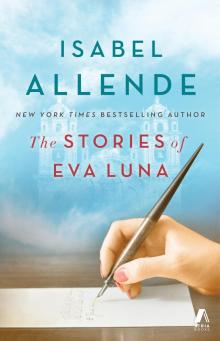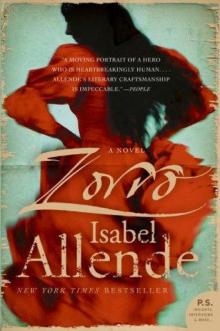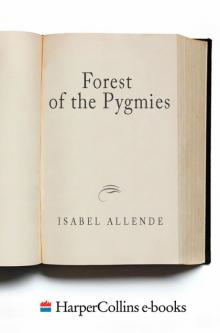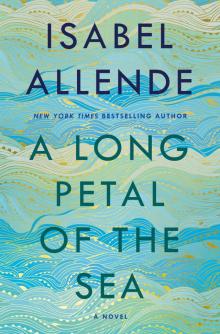- Home
- Isabel Allende
Maya's Notebook Page 2
Maya's Notebook Read online
Page 2
I heard my grandparents’ possibly fictionalized love story many times, and ended up memorizing it word for word, like a poem. I don’t know, of course, the details of what happened that night behind closed doors, but I can imagine them based on what I know about both of them. Did my Popo suspect, when he opened the door to this tiny Chilean woman, that he was at a crucial juncture and that the road he chose would determine his future? No, I’m sure, such tackiness would never have crossed his mind. And my Nini? I see her advancing like a somnambulist through the clothes thrown on the floor and the overflowing ashtrays, crossing the little living room, walking into the bedroom, and sitting down on the bed, because the armchair and all the other chairs were covered in papers and books. He would have knelt down beside her to embrace her, and they’d have stayed like that for a long time, trying to accommodate themselves to this sudden intimacy. Maybe she began to feel stifled in the heat, and he helped her to get out of her coat and boots; then they caressed each other hesitantly, recognizing each other, delving into their souls to make sure they weren’t mistaken. “You smell of tobacco and dessert. And you’re smooth and black like a seal,” my Nini told him. I heard that phrase many times.
The last part of the legend I don’t have to invent, because they told me. With that first embrace, my Nini concluded that she’d known the astronomer in other lives and other times, that this was just a re-encounter and that their astral signs and tarot cards were aligned. “Thank goodness you’re a man, Paul. Imagine if in this reincarnation you’d come back as my mother,” she sighed, sitting on his lap. “Since I’m not your mother, why don’t we get married?” he answered.
Two weeks later she arrived in California dragging her son, who had no desire to emigrate for a second time, with a three-month engagement visa, at the end of which she had to either get married or leave the country. They got married.
I spent my first day in Chile wandering around Santiago with a map, in a heavy, dry heat, killing time until my bus left for the south. It’s a modern city, with nothing exotic or picturesque—no Indians in traditional clothes or colonial neighborhoods with boldly colored houses, like the ones I’d seen with my grandparents in Guatemala or Mexico. I took a funicular to the top of a hill, an obligatory trip for tourists, and got an idea of the size of the capital, which looks like it goes on forever, and of the pollution that covers it like a dusty mist. At dusk I boarded an apricot-colored bus heading south, to Chiloé.
I tried and tried to sleep, lulled by the movement, the purring of the motor, and the snores of the other passengers, but it’s never been easy for me to sleep, and much less now, when I still have residues of the wild life running through my veins. When the sun came up we stopped to use the restroom and have a coffee at a posada, in a pastoral landscape of rolling green hills and cows, and then we went on for another several hours until we reached a rudimentary port, where we could stretch our legs and buy cheese and seafood empanadas from some women wearing white coats like nurses. The bus boarded a ferry to cross the Chacao Channel: half an hour sailing silently over a luminous sea. I got off the bus to look over the edge with all the rest of the numb passengers, who, like me, had spent many hours imprisoned in their seats. Defying the biting wind, we admired the flocks of swallows, like kerchiefs in the sky, and the toninas, dolphins with white bellies that danced alongside the ferry.
The bus left me in Ancud, on the Isla Grande, the second largest city of the archipelago. From there I had to take another bus to the town where Manuel Arias was expecting me, but I discovered that my wallet was missing. My Nini had warned me about Chilean pickpockets and their magician’s skill: they’ll very kindly steal your soul. Luckily they left my photo of my Popo and my passport, which I had in the other pocket of my backpack. I was alone, without a single cent, in an unknown country. If I’d learned anything from last year’s ill-fated adventures, though, it was not to get overwhelmed by minor inconveniences.
In one of the little souvenir shops in the plaza, where they sold Chiloé knits, three women sat in a circle, chatting and knitting. I assumed that if they were like my Nini, they’d help me; Chilean women fly to the rescue of anyone in distress, especially an outsider. I explained the problem in my hesitant Spanish, and they immediately dropped their knitting needles and offered me a chair and an orange soda while they discussed my case, talking over each other in their rush to give opinions. They made several calls on a cell phone and got me a lift with a cousin who was going my way; he could take me in a couple of hours and didn’t mind making a short detour to drop me off at my destination.
I took advantage of the wait to have a look around town and visit a museum of the churches of Chiloé, designed by Jesuit missionaries three hundred years earlier and raised plank by plank by the Chilotes, master boat builders who can make anything out of wood. The structures are created by an ingenious assembly system without using a single nail, and the vaulted ceilings are upside-down boats. As I came out of the museum I met a dog. He was medium in size, lame, with stiff gray fur and a lamentable tail but the dignified demeanor of a pedigree animal. I offered him the empanada I had in my backpack, and he took it gently in his big yellow teeth, put it down on the ground, and looked at me, telling me clearly that his hunger was not for food but for company. My stepmother, Susan, was a dog trainer and had taught me never to touch any animal before they approach, which they’ll do when they feel safe, but with this one we skipped the protocol and from the start we got along well. We did a little sightseeing together, and at the agreed time I went back to where the women were knitting. The dog stayed outside the shop, politely, with just one paw on the threshold.
The cousin showed up an hour later than he said he would in a van crammed to the roof with stuff, accompanied by his wife with a baby at her breast. I thanked my benefactors, who had also lent me the cell phone to get in touch with Manuel Arias, and said good-bye to the dog, but he had other plans: he sat at my feet and swept the ground with his tail, smiling like a hyena; he had done me the favor of honoring me with his attention, and now I was his lucky human. I changed tactics. “Shoo! Shoo! Fucking dog,” I shouted at him in English. He didn’t move, while the cousin observed the scene with pity. “Don’t worry, señorita, we can bring your Fahkeen,” he said at last. And in this way that ashen creature acquired his new name; maybe in his previous life he’d been called Prince. We could barely squeeze into the jam-packed vehicle. An hour later we arrived in the town where I was supposed to meet my grandmother’s friend, who’d said to wait in front of the church, facing the sea.
The town, founded by the Spanish in 1567, is one of the oldest in the archipelago and has a population of two thousand, but I don’t know where they all were—I saw more hens and sheep than humans. I waited for Manuel for a long time, sitting on the steps of a blue-and-white-painted church with Fahkeen and observed from a certain distance by four silent and serious little kids. All I knew about Manuel was that he was a friend of my grandmother’s and that they hadn’t seen each other since the 1970s but had kept in touch sporadically, first by letter, as they did in prehistoric times, and then by e-mail.
Manuel finally appeared and recognized me from the description my Nini had given him over the phone. What would she have told him? That I’m an obelisk with hair dyed four primary colors and a nose ring. He held out his hand and looked me over quickly, evaluating the remains of blue nail polish on my bitten fingernails, frayed jeans, and the commando boots, spray-painted pink, that I’d gotten at a Salvation Army store when I was on the streets.
“I’m Manuel Arias,” the man introduced himself, in English.
“Hi. I’m on the run from the FBI, Interpol, and a Las Vegas criminal gang,” I announced bluntly, to avoid any misunderstandings.
“Congratulations,” he said.
“I haven’t killed anybody, and frankly, I don’t think any of them would go to the trouble of coming to look for me all the way down here in the asshole of the world.”
“Thanks.�
��
“Sorry, I didn’t mean to insult your country, man. Actually it’s really pretty, lots of green and lots of water, but look how far away it is!”
“From what?”
“From California, from civilization, from the rest of the world. My Nini didn’t tell me it’d be cold.”
“It’s summer,” he informed me.
“Summer in January! Who’s ever heard of that!”
“Everyone in the southern hemisphere,” he replied dryly.
Bad news, I thought—no sense of humor. He invited me to have a cup of tea while we waited for a truck that was bringing him a refrigerator and should have been there three hours ago. We went into a house marked with a white cloth flying from a pole, like a flag of surrender, a sign that they sell fresh bread there. There were four rustic tables with oilskin tablecloths and unmatched chairs, a counter, and a stove, where a soot-blackened kettle was boiling away. A heavyset woman with a contagious laugh greeted Manuel Arias with a kiss on the cheek and looked at me a little warily before deciding to kiss me too.
“Americana?” she asked Manuel.
“Isn’t it obvious?” he said.
“But what happened to her head?” she added, pointing to my dyed hair.
“I was born this way,” I told her cheekily in Spanish.
“The gringuita speaks Christian!” she exclaimed with delight. “Sit, sit down, I’ll bring you a little tea right away.”
She took me by the arm and sat me down resolutely in one of the chairs, while Manuel explained that in Chile a gringo is any blond English-speaking person, and when the diminutive is used, as in gringuito or gringuita, it’s a term of affection.
The innkeeper brought us tea, a fragrant pyramid of bread just out of the oven, butter, and honey, then sat down with us to make sure we’d eat as much as we should. Soon we heard the sneezing of a truck that bounced along the unpaved, potholed street, a refrigerator balanced in the back. The woman leaned out the door and whistled, and a moment later several young men were helping to get the appliance off the back of the truck, carry it down to the beach, and load it onto Manuel’s motorboat using a gangway of planks.
The vessel was about twenty-five feet long, fiberglass, painted white, blue, and red, the colors of the Chilean flag—almost the same as that of Texas—that flew from the prow. The name was painted along one side: Cahuilla. They tied the refrigerator on as well as possible while keeping it upright and helped me in. The dog followed me with his pathetic little trot; one of his paws was a bit shriveled, and he walked leaning to one side.
“And this guy?” Manuel asked me.
“He’s not mine—he latched on to me in Ancud. I’ve been told that Chilean dogs are very intelligent, and this one’s a good breed.”
“He must be a cross between a German shepherd and a fox terrier. He’s got the body of a big dog with a little dog’s short legs,” was Manuel’s opinion.
“After I give him a bath, you’ll see how fine he is.”
“What’s his name?” he asked.
“Fucking dog, in Chilean.”
“What?”
“Fahkeen.”
“I hope your Fahkeen gets along with my cats. You’ll have to tie him up at night so he won’t go out and kill sheep,” he warned me.
“That won’t be necessary—he’s going to sleep with me.”
Fahkeen squashed himself into the bottom of the boat, his nose in between his front paws, and stayed absolutely still there, never taking his eyes off me. He’s not affectionate, but we understand each other in the language of flora and fauna: telepathic Esperanto.
From the horizon an avalanche of big clouds rolled toward us; an icy wind was blowing, but the sea was calm. Manuel lent me a woolen poncho and didn’t say anything more, concentrating on steering and the instruments, compass, GPS, marine wave radio, and who knows what else, while I studied him out of the corner of my eye. My Nini had told me that he was a sociologist, or something like that, but in his little boat he could pass for a sailor: medium height, thin, strong, fiber and muscle, cured by the salty wind, with wrinkles of stern character, short thick hair, eyes as gray as his hair. I don’t know how to calculate the age of old people. Manuel looks okay from a distance—he walks fast and hasn’t got that hump old men get—but up close I can tell he is older than my Nini, so he must be seventy-something. I’ve dropped into his life like a bomb. I’ll have to walk on eggshells, so he won’t regret having given me shelter.
After almost an hour on the water, passing quite a few islands that appeared uninhabited, even though they weren’t, Manuel Arias pointed to a headland that from the distance was barely a dark brushstroke but up close turned out to be a hill with a beach of blackish sand and rocks at the edge of it, where four wooden boats were drying upside down. He docked the Cahuilla at a floating wharf and threw a couple of thick ropes to a bunch of kids who’d come running down to meet us, and they tied the boat to some posts quite capably. “Welcome to our metropolis,” said Manuel, pointing to a village of wooden houses on stilts in front of the beach. A shiver ran up my spine; from here on in, this would be my whole world.
A group came down to the beach to inspect me. Manuel had told them an American girl was coming to help him with his research; if these people were expecting someone respectable, they were in for a disappointment. The Obama T-shirt I was wearing, a Christmas present from my Nini, wasn’t long enough to cover my belly button.
Unloading the refrigerator without tilting it was a job for several volunteers, who encouraged each other, laughed loudly, and hurried as it was starting to get dark. We walked up to town in a procession, the refrigerator in the lead, then Manuel and I, behind us a dozen shouting little kids, and, bringing up the rear, a ragtag bunch of dogs furiously barking at Fahkeen, without getting too close; his air of supreme disdain clearly indicated that the first to do so would suffer the consequences. Fahkeen, who seemed difficult to intimidate, wouldn’t let any of them smell his butt. We passed a cemetery, where a few goats with swollen udders were grazing among the plastic flowers and what looked like dollhouses marking the graves, some with furniture for the use of the dead.
In the village, wooden bridges connected the stilt houses. In the main street—to give it a name—I saw donkeys, bicycles, a jeep with the crossed-rifles emblem of the carabineros, the Chilean police, and three or four old cars, which in California would be collectors’ items if they were less banged up. Manuel explained that due to the uneven terrain and inevitable mud in the winter, all heavy transport is done by oxen cart, the lighter stuff by mules; people get around on horseback and on foot. A few faded signs identified some humble shops—a couple of grocery stores, a pharmacy, several bars, two restaurants, which consisted of a couple of metal tables in front of a couple of fish shops, and one Internet café, which sold batteries, soda pop, magazines, and knickknacks to the visitors who arrived once a week, carted in by ecotourism agencies, to enjoy the best curanto in Chiloé. I’ll describe curanto later on, because I haven’t tried it yet.
Some people came out to take a cautious look at me, in silence, until a short, stocky man decided to say hello. He wiped his hand on his pants before offering it to me, smiling with teeth edged in gold. This was Aurelio Ñancupel, descendant of a famous pirate and the most necessary person on the island—he sells alcohol on credit, extracts molars, and has a flat-screen TV, which his customers enjoy when there’s electricity. His place has a very appropriate name: the Tavern of the Dead. Because of its advantageous location near the cemetery, it’s the obligatory stopping point at which mourners can alleviate the sorrow of every funeral.
Ñancupel had become a Mormon, attracted by the idea of having several wives, and discovered too late that the Mormons had renounced polygamy after a new prophetic revelation, more in line with the U.S. Constitution. That’s how Manuel Arias described him to me, while the man himself doubled over with laughter, echoed by the crowd. Manuel also introduced me to other people, whose names I couldn’t
remember, who seemed too old to be the parents of that gang of children; now I know they’re the grandparents; the generation in between all work far from the island.
So then this fiftyish woman with a commanding air came walking up the street. She looked tough and attractive, with hair that beige color blond turns when it goes gray, done up in a messy bun at the nape of her neck. This was Blanca Schnake, principal of the school, who people call, out of respect, Auntie Blanca. Kissing Manuel on the cheek, the way they do here, she gave me an official welcome in the name of the community, which dissolved the tension in the atmosphere and tightened the circle of nosy bystanders around me. Auntie Blanca invited me to visit the school the next day and offered me free use of the library, with its two computers and video games, which I can use till March, when the kids go back to class; after that the timetable will be more limited. She added that on Saturday they showed the same movies at the school that were playing in Santiago, but for free. She bombarded me with questions, and I summed up, in my beginner’s Spanish, my two-day trip from California and the theft of my wallet, which provoked a chorus of laughter from the kids, quickly silenced by a glacial look from Auntie Blanca. “Tomorrow I’m going to make you some machas a la parmesana, so the gringuita can start getting to know some Chiloé cuisine. I’ll expect you around nine,” she told Manuel. Afterward I found out that machas are a special kind of razor clam found only in the southern Pacific, and that the correct thing to do is to arrive an hour after the time you’re told. They have dinner very late here.

 The Stories of Eva Luna
The Stories of Eva Luna The House of the Spirits
The House of the Spirits Paula
Paula Ines of My Soul
Ines of My Soul Of Love and Shadows
Of Love and Shadows Kingdom of the Golden Dragon
Kingdom of the Golden Dragon Daughter of Fortune
Daughter of Fortune City of the Beasts
City of the Beasts Maya's Notebook
Maya's Notebook Eva Luna
Eva Luna Zorro
Zorro In the Midst of Winter
In the Midst of Winter Forest of the Pygmies
Forest of the Pygmies My Invented Country: A Nostalgic Journey Through Chile
My Invented Country: A Nostalgic Journey Through Chile The Japanese Lover
The Japanese Lover Portrait in Sepia
Portrait in Sepia Island Beneath the Sea
Island Beneath the Sea The Soul of a Woman
The Soul of a Woman A Long Petal of the Sea
A Long Petal of the Sea Ines of My Soul: A Novel
Ines of My Soul: A Novel The Sum of Our Days
The Sum of Our Days